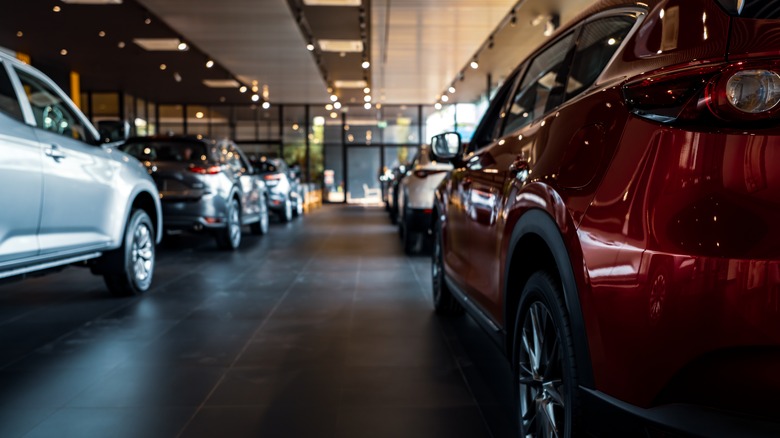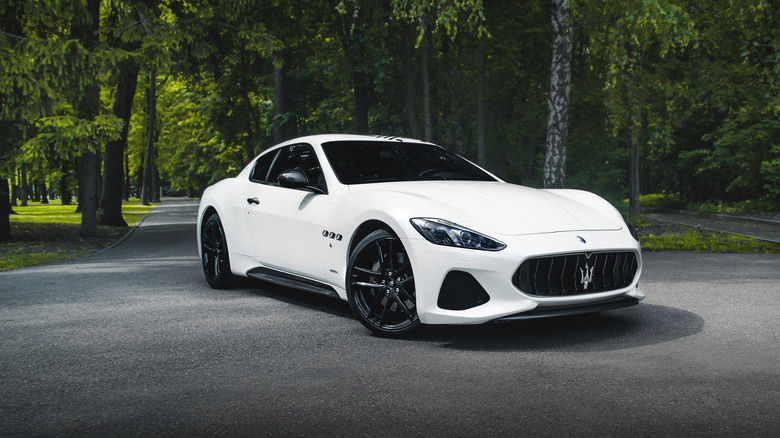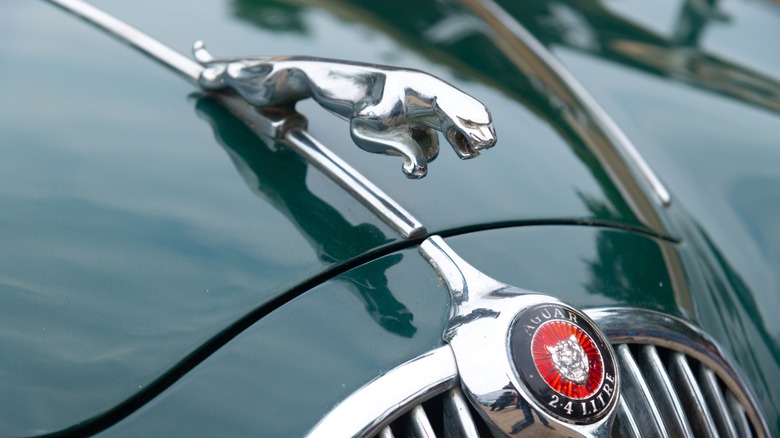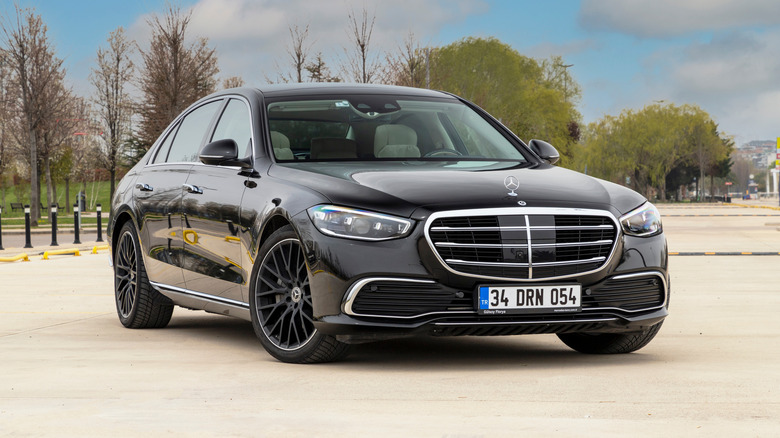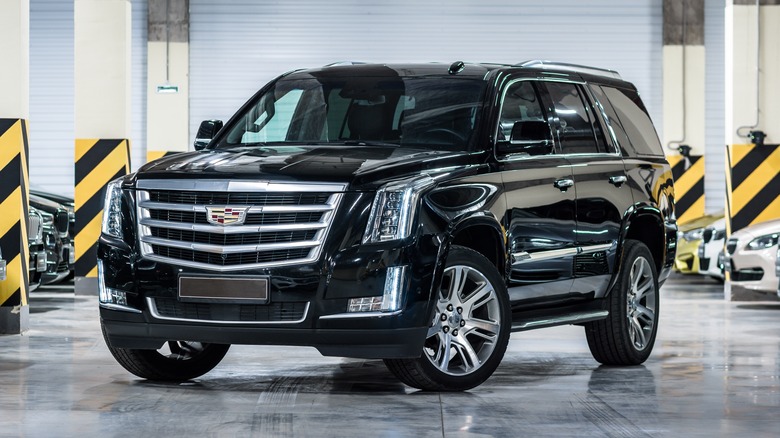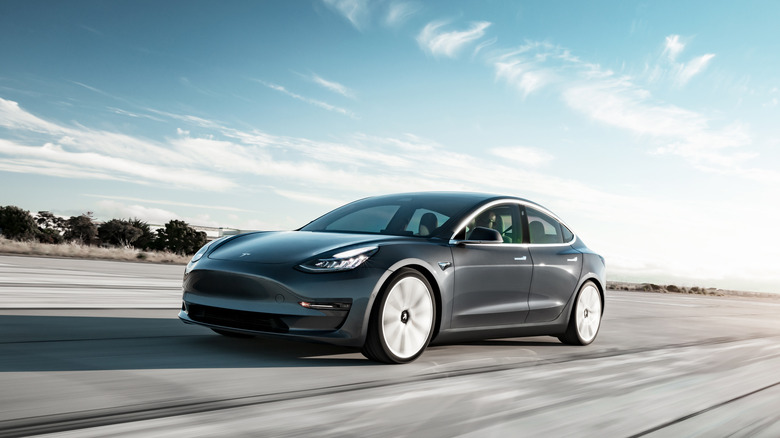5 Luxury Car Brands That Have The Worst Resale Values
Luxury cars offer drivers a wonderful experience on the road. They provide enhanced comfort and a smoother ride in virtually all cases over more economical options, and the engines, braking, and many other performance specifications far exceed the capacity of standard models.
Plenty of drivers swear by their favorite luxury brand – Mercedes-Benz, Jaguar, or BMW – and will only buy within their preferred brand. Even still, it's important to understand the economics of a new car purchase, especially if you're thinking of remaining locked into a singular brand for your transportation needs for the long term. Many luxury cars offer prestige and comfort, but their depreciation also far exceeds that of a more typical vehicle on the road in many instances.
HotCars reports that luxury vehicles tend to lose value faster than other cars because of the heightened maintenance costs as a driving factor. While other features play a role as well, the increased cost to maintain one of these vehicles tends to translate into shorter warranty periods and a longer timeline of owner-funded maintenance and repairs. As a result, owners often try to offload their luxury cars faster than those who own a more standard model. Not only are luxury cars a more specialized, niche space, but the prospect of increased maintenance alongside potential issues that a former owner may be trying to avoid makes for a sizeable depreciation rate that can't be ignored.
Maserati
Maserati has long been known as a master automaker. However, for much of its history, Maserati vehicles have hemorrhaged value for their owners. The Maserati Quattroporte was named the car with the worst three-year depreciation in 2019 (via Maserati Louisville), and Your Sydney Mate Motors reported in 2022 that the Maserati Ghibli lost value at a very similar pace over the course of typical ownership. YSM Motors estimates that the average Maserati will lose 45% of its value over three years of a new purchase, with some models ranging as high as 60%. Furthermore, any custom autos that you might consider from the manufacturer fare even worse: Losing up to 80% of the original value!
Unlike just about all of the other brand names on this list, Maserati produces ultra-lux vehicles. YSM Motors notes that the resale market for vehicles like this is virtually nonexistent. Anyone thinking of buying a Maserati, or any number of similar brands (like Ferrari, Lamborghini, or others) is someone with a large enough budget to buy a new model. There's simply not much sense in buying a used vehicle in this case. This makes offloading an older Maserati a significant pain for someone seeking an upgrade and lacking the funds to just dump the car, regardless of the value it brings back. As a result, this segment of the automotive market remains generally closed off to typical buyers who will certainly care about the value their trade-in brings to the table.
Jaguar
Jaguar vehicles have been a vibrant part of road history for generations. The brand recently celebrated the 60th anniversary of its immensely popular E-type, and Jaguar has been working hard on electric models that will power the company into the future of auto production.
Even so, Jaguar has showcased both a staying power in the industry and a dismal record when it comes to resale value. HotCars notes that Jaguar parts are notoriously difficult to find, so repair costs can be steep for even the most basic alterations and fixes. Losing as much as 40% of its value in the first few years of ownership, a typical Jaguar isn't a ride for the faint of heart or a fickle car owner who likes to change their ride on a regular basis. HotCars also reports that Jaguars have often suffered from reliability issues like dodgy breaks, routine engine troubles, and offroad performance problems. These all add to the total volume of repairs an owner might have to make. As with many other makes listed here, continuing reliability issues only become more pronounced as a vehicle ages. This makes a used Jaguar, Maserati, or Mercedes an increasing liability on an owner's wallet for each additional year the vehicle is in their service, regardless of how beautiful the car looks or luxurious the ride.
Mercedes-Benz
Mercedes-Benz is another luxury automaker that produces highly sought-after vehicles. Mercedes are some of the most visually pleasing cars on the road, and yet their resale value is just as bad as some of the worst offenders listed above. HotCars notes that a Mercedes-Benz is likely to see a value hit of more than 40% after five to six years of ownership. These cars exhibit some of the fastest depreciation rates on the road. The vehicles are engineered to perfection, and this gives drivers a precision experience while flying around the local highways or downtown metro area. However, this precision tuning means that only specialized mechanics are able to perform services and routine maintenance on the vehicle: Unfortunately, this means a premium price tag for a premium service.
Similarly, Mercedes-Benz parts are expensive and often somewhat scarce, making every aspect of a service costly. One thing to be wary of if you're considering a new or used Mercedes is the service record. Because of the heightened expense, some owners may opt for alternative parts, which weren't designed for use specifically in these vehicles. A non-Mercedes replacement part may work fine in the vehicle, but chopping and changing like this can add to the depreciation of the car. As an owner, you may be tempted to settle for a suitable alternative, but this can hamstring your resale value when it comes time to trade in or sell the old ride.
Cadillac
A staple of the American luxury muscle scene, the Cadillac may be a surprising addition to this list. Cadillacs are a highly visible contingent of modern Secret Service motorcades (via U.S. Secret Service), adding to their prestige as a reliable workhorse. Yet, Cadillacs have been known to see substantial upgrades in technology throughout the years (in the consumer marketplace, that is), according to Rusty Autos. This makes relatively young Cadillac models routinely move toward obsolescence at a rapid pace. Moreover, the Cadillac is notorious for maintenance requirements. Much like the Mercedes brand, Cadillacs require specialized parts and techniques to perform services, adding to the total cost of ownership.
Perhaps the most important feature of the Cadillac depreciation scale is the level of prestige that an owner can expect to muster. New and spectacularly adorned Cadillacs command an air of respect like few other vehicles on the road. But as they age, this grandiose statement becomes increasingly muted. This makes the resale market fairly bleak for Caddy owners looking to offload an out-of-style model in an effort to upgrade their ride.
Tesla
Teslas make the list as a result of their propulsion. Electric vehicles don't enjoy very productive resale values because they include a ticking clock from the very moment they enter service. The battery on an EV is the heaviest and most costly component of the entire vehicle, and it degrades at a rate of roughly 2.5% with every year of use. EDF Energy reports that estimates place the lifespan of a typical EV battery at 10 to 20 years. This means that you'll likely break even on the cost of ownership when considering the savings your vehicle will provide with each 'fill up.' But this only happens if you keep it for a decade or longer. In a similar market condition to the ultra-luxurious automobiles that have little to no resale demand, EVs lose cache with buyers as they age because this lifespan gets shorter. The functional maximum range is depleted and with each passing year, an EV's break-even point becomes slimmer for a potential new owner. EVs provide their best value when purchased new (or perhaps with a maximum of just a year or two under their belt, via CarEdge). After this point, their value sinks like a stone.
One of the most egregious of the EV bunch is Tesla. Teslas have shown a wealth of recall issues from power steering trouble to airbag deployment problems. Owners have reported numerous quality control lapses in their new Teslas, so the marketplace for used Tesla models is unsurprisingly slim. This means that Tesla owners will have trouble making back a respectable chunk of their investment if they opt to sell or trade in their cars early.
